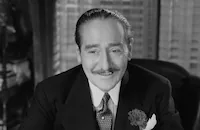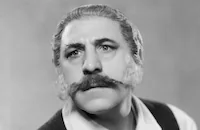Forbidden

Brief Synopsis
Cast & Crew
Frank R. Capra
Barbara Stanwyck
Adolphe Menjou
Ralph Bellamy
Dorothy Peterson
Thomas Jefferson
Film Details
Technical Specs

Synopsis
After librarian Lulu Smith is accused by her patrons of having Spring fever, she spends her life savings on a cruise to Havana, during which she begins a romance with Bob Grover, a lawyer with political ambitions. After their return, Lulu becomes a clerical assistant for a newspaper, where she is pursued by brash reporter Al Holland. One night, several months into their affair, Bob comes to Lulu's apartment for dinner, bringing two Halloween masks with which they have a marvelous time playing. Their merriment is interrupted by a call from Al, whose proposal to Lulu prompts Bob to confess that he has an invalid wife whom he cannot leave. Lulu protests that she wishes to continue their affair, but Bob refuses to let her waste her life on him. They squabble, and Lulu throws him out without telling him she is pregnant. Time passes and Bob becomes district attorney, while Al becomes city editor of the newspaper. After Bob hires a detective, Marty, to find Lulu, the couple are reunited and Lulu introduces Bob to his daughter Roberta. Later, Lulu and Roberta are waiting to meet Bob, when Al suddenly appears. He is questioning her about Roberta when Bob arrives, and, in order to protect Bob's reputation, Lulu tells Al that the baby is Bob's adopted daughter and that she is her governess. In order to preserve the charade, Bob does adopt Roberta, taking her home the next day to present to his wife Helen, who is returning from a European rest cure. Helen is delighted with the child but questions Lulu's ability to care for her. Lulu runs out of the house, and when Bob follows her, she tries to tell him she is through with him but cannot. Soon after, Lulu goes to Al for a job and becomes the "advice to the lovelorn" columnist for his paper. Al pumps her for information about Bob and Roberta in order to write a story causing Bob's downfall, but Lulu refuses to say anything. As the years pass, Lulu still works for the paper, and Al, now the managing editor, is still pursuing her. Bob has been both a mayor and a congressman, but on the night he wins the nomination for governor, he becomes disheartened, ashamed of the hypocrisy of his double life. Lulu tries to talk him out of confessing the truth and ruining his career, but when it seems that she cannot succeed, she asks Al to marry her, hoping that will make Bob forget about her. On the night of Bob's election, however, Al tells her that he knows all about her, Bob and Roberta, and Lulu kills him to prevent him from publishing the story. A year later, Bob is on his deathbed, and Lulu, whom he had pardoned after a short jail term, comes to visit him. He shows her his new will, which tells the truth and leaves her half of his estate, but after he dies, she tears it up to protect him and Roberta, who is engaged to a socially prominent young man.

Director

Frank R. Capra
Cast

Barbara Stanwyck

Adolphe Menjou

Ralph Bellamy

Dorothy Peterson
Thomas Jefferson
Myrna Fresholt

Charlotte V. Henry
Oliver Eckhardt

Halliwell Hobbes

Eddie Kane

Henry Armetta
Crew

Photo Collections
Videos
Movie Clip


Film Details
Technical Specs

Articles
Forbidden
In his autobiography, The Name Above the Title, Capra made it clear that he was still developing as a filmmaker during the period in which he made Forbidden. "Platinum Blonde recharged my cockiness," he wrote. "The less-than-miraculous Miracle Woman [also starring Stanwyck] was the only entry in my Columbia "loss" column. I demanded a rematch with "ideas." But this time, by George, on my terms. I would write my own "idea" film. I fancied I could write, anyway. So, with a very large assist from Fannie Hurst's Back Street, I wrote an "original" story, Forbidden...I had yet to learn that drama is not really just actors weeping and suffering all over the place. It isn't drama unless the audiences are emotionally moved. Actors' crocodile tears alone can't touch their hearts. But courage, faith, love, and sacrifices for others will - if believable. In spite of scriptwriter Jo Swerling's valiant efforts to write in some "bones," Forbidden ended up as two hours of soggy, 99.44% pure soap opera. Some critics moistened their reviews with tears, most burned them with acid. Forbidden was saved from the "loss" column by one or two directorial "gems" (sic), and the fine believable performances of Barbara Stanwyck, Adolphe Menjou, and Ralph Bellamy (one of his earliest films)."
Barbara Stanwyck didn't want to make Forbidden because she felt Columbia studios was not honoring their contract with her. According to Joseph McBride in Frank Capra: The Catastrophe of Success, "Forbidden was set to start filming in April 131, shortly after the completion of The Miracle Woman. But Stanwyck was having a contract dispute with Harry Cohn. She was obligated to make three more pictures for Columbia on a nonexclusive basis. Following her success in Ladies of Leisure, she also had made a deal with Warner Bros., but she felt she deserved more from Columbia now that her name had more box-office allure. Cohn was paying her #2,000 a week, but only when she was actually making a film (usually about a six-week period). She held out for more, and on July 17 it was announced to the trade press that she had "failed to put in an appearance at the Columbia studio for the production of Forbidden...As it stands now, Forbidden has been laid aside and Miss Stanwyck claims screen retirement."
While Cohn attempted to pressure Stanwyck into making the film, Capra moved on to his next project, a comedy with the working title of first, The Blonde Lady, and then Gallagher, which eventually was released as Platinum Blonde. For a while, Columbia fed the press reports that Helen Hayes was being considered as a replacement for Stanwyck in Forbidden and then Cohn took Stanwyck to court and won his case. Stanwyck agreed to return to work at Columbia but even though Cohn had gotten his way, he agreed to raise her salary to $5,000 a week and allow her to make three films for Warner.
The filming of Forbidden was relatively noneventful except for the occasional appearance of Frank Fay, Stanwyck's husband, on the set. The couple was going through a difficult time in their marriage and it may have had to do with Stanwyck's sudden popularity which Fay, also an actor, had a hard time accepting. He was also extremely possessive and jealous and was usually in a hostile mood when he visited the Forbidden set. "I can remember vividly how the crew would separate and make way for him," Ralph Bellamy said (in McBride's biography). "He was a very unpopular guy - and worked at it." At the same time, Fay didn't seem to be aware that Stanwyck and Capra were having an affair. They were very discreet and never linked together romantically by the press at the time.
The only other incident that affected the filming of Forbidden occurred in Malibu when Stanwyck was injured in a horseback-riding scene for the film. "It's a little hard to believe now," wrote Ella Smith in her book, Starring Miss Barbara Stanwyck, "but Stanwyck was then afraid of horses. A double had done the riding, and Capra was preparing for a close-up of Stanwyck on the animal. He thought he had taken every precaution, but when the reflectors caught the light, they bounced it into the horse's eyes and scared him. He reared, threw her, and - because his feet were in wet sand - lost his balance and fell back on her. The soft sand saved her, but not from injury."
Ralph Bellamy recalled (in The Films of Frank Capra) that "Forbidden was the fourth of my ninety-six feature pictures to date, and....it's still one of my most pleasant memories. Barbara Stanwyck had just become a star of magnitude and a dream to work with. And Frank Capra was just beginning to be recognized as the great director he became. The picture wasn't a classic, but it was a great part and fun to do."
As Capra had previously stated, Forbidden was not well received by the critics. A typical opinion was expressed by Mordaunt Hall in The New York Times which called it "a cumbersome effort at storytelling...It happens invariably when a director tackles his own brainchild that the result is disappointing." Capra would have much better luck with his next picture, American Madness (1932), and Stanwyck would follow this with another "women's picture" for Columbia, Shopworn (1932), which fared much better with critics and audiences alike.
Producer: Harry Cohn
Director: Frank R. Capra
Screenplay: Jo Swerling; Frank Capra (story)
Cinematography: Joseph Walker
Music: Irving Bibo, David Broekman, Alfonso Corelli (all uncredited)
Film Editing: Maurice Wright
Cast: Barbara Stanwyck (Lulu Smith), Adolphe Menjou (Bob Grover), Ralph Bellamy (Al Holland), Dorothy Peterson (Helen Grover), Thomas Jefferson (Wilkinson), Oliver Eckhardt (Briggs), Charlotte Henry (Roberta, age 18, Myrna Fresholt (Roberta as a baby)
BW-85m.
by Jeff Stafford

Forbidden
Quotes
Trivia
Notes
In his autobiography, director Frank Capra admitted that he wrote the story for Forbidden "with a very large assist from Fannie Hurst's Back Street" (New York, 1931). According to contemporary news items, this film was supposed to have begun production on July 15, 1931 but was delayed due to Barbara Stanwyck's contract dispute with Columbia. While the case was in court, Capra directed Platinum Blonde. After the case was settled, Stanwyck agreed to do Forbidden for the salary stipulated in her contract. According to Hollywood Reporter, Paul Muni was to have co-starred with Stanwyck and Adolphe Menjou. Actor Ralph Bellamy was borrowed from Fox. Although the copyright material and contemporary reviews list Tom Ricketts as "Briggs," the film credits Oliver Eckhardt with the role. A Hollywood Reporter news item does include Ricketts and Martha Mattox in the cast, but their participation in the film has not been verified. Hollywood Reporter also stated that Florence Wix and Claude King were added to the cast. Modern sources also include them and their respective character names, "Mrs. Smith" and "Mr. Jones." A August 31, 1932 Film Daily news item noted that Forbidden was "hailed as a 'screen masterpiece' at the recent International Cinematographic Show in Venice [where] Senator Marconi, Luigi Pirandello and other noted personages were the judges." According to correspondence in the MPAA/PCA Collection at the AMPAS Library, Forbidden was rejected by the PCA in 1935 when Columbia, attempting to re-issue the picture, submitted it for approval. In a letter to Will H. Hays, PCA Director Joseph I. Breen stated that the film "violated the Code, inasmuch as it was basically a glorification of adultery."
According to modern sources, Helen Hayes was first offered the part of Lulu Smith. Modern sources credit Edward Stevenson with costumes and list the following additional cast members: Robert Graves (Mr. Eckner), Harry Holman (Mick, advice to the lovelorn columnist), Bob Parrish, Dick Winslow, Cooke Phelps, Roger Byrne (Office boys), Carmencita Johnson, Seesel Ann Johnson, Larry Dolan, Lynn Compton (Children in Halloween scene), Helen Stuart, Frankie Raymond, Gertrude Pedlar and Wilfred Noy. Modern sources also mention that the film was shot in part at Laguna Beach and Venice, CA.














